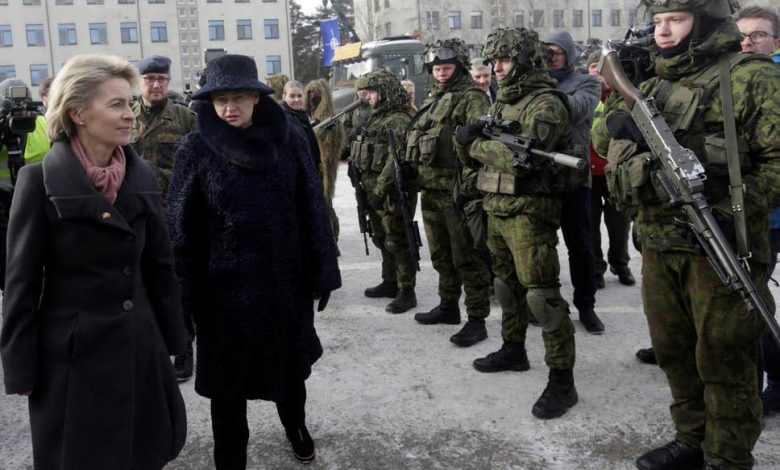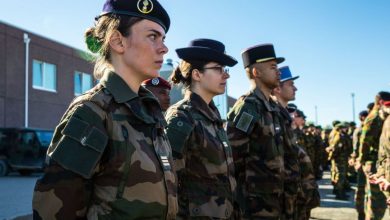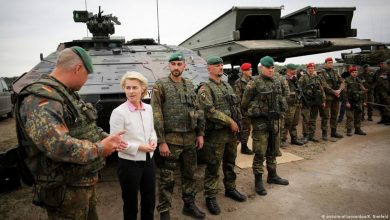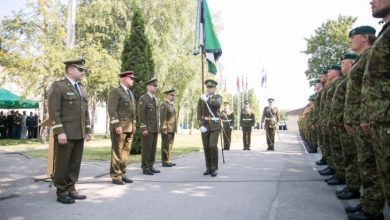Germany sends its soldiers to Lithuania
More than 500 Bundeswehr soldiers are sent to Lithuania to strengthen NATO in Eastern Europe. According to Lithuanian President Dali Grybauskaite, for her country this is a “historical frontier”.
The small Bavarian town of Oberficht near the Czech border is not very noticeable, with the exception of the Bundeswehr barracks located against the backdrop of the magnificent nature. But now they are almost empty. On Thursday, January 19, 500 troops, about 200 combat vehicles, including 30 tracked ones, primarily Marder armored personnel carriers and Leopard tanks, left for Lithuania from here.
Before sending the 122nd Motorized Infantry Battalion to Bavarian Oberfichtach, the key training point for soldiers was the tactics of deterring aggression, said battalion commander Senior Lieutenant Christoph Huber. Such tactics are not an attack or a classic position defense, but exhausting an attacking enemy in order to gain time until reinforcements arrive.
German soldiers call their service in Lithuania “lengthy maneuvers,” which will take six months. After that, soldiers from Oberfichtach will be replaced by soldiers from Marienberg in the Ore Mountains.
4 NATO battalions
They will be part of the first battalion of NATO forward-based forces in Lithuania with a total of 1,000 troops under German command. In addition, the battalion will include troops from Norway, Belgium and the Netherlands.
Another thousand NATO soldiers will be stationed in Estonia – they will be commanded by Great Britain. And the same amount – under the command of Canada – in Latvia.
One NATO battalion, which will be commanded by the United States, is planned to be deployed in northeast Poland. The first American armored brigade arrived in Poland on January 15th. She will be deployed in Zagani.
The deployment of four battalions in the Baltic countries and Poland takes place as part of NATO’s strategy to strengthen the eastern flank and contain Russia. The decision was made in July 2016 at the alliance summit in Warsaw.
“The time of doubt has passed”
Previously, short-term Allied maneuvers took place in the Baltic countries and Poland more than once. In addition, NATO military aircraft have been patrolling the airspace over the Baltic for several years. Since the annexation of Crimea and the conflict in eastern Ukraine, the Baltic countries have repeatedly stated their vulnerability to Russia’s aggressive policies. In this regard, NATO has stepped up patrolling the airspace of its Baltic allies. And then she decided to strengthen the eastern flank.
The deployment of the Bundeswehr soldiers in Lithuania is a sign of confidence in Germany, the country’s leadership believes. “The decision to deploy a battalion in Lithuania means that Berlin has managed to achieve a leading role in the European security system,” stressed Lithuanian President Dalia Grybauskaite. “This is a historic frontier. A time of doubt, fear, lack of willingness to take responsibility and fears, what the Russian president will think Vladimir Putin, it’s over. “
The former chairman of the Lithuanian Seimas Vytautas Landsbergis, who in 1988-1991 led the Lithuanian independence movement from the Soviet Union, was pleased with the deployment of German troops in the country. “Lithuania feels more confident with its allies,” he said in an interview with DW.
“Lithuania feels more confident with allies”
Many experts today are confident that the Baltic countries with their Russian-speaking minority in the population and small armies are exposed to various dangers from Moscow.
Of particular concern to military experts and residents of the Baltic region is the Suwals Isthmus in northeastern Poland, near the border with Russia and Belarus. It is the only channel through which the alliance passes overland with the Baltic states and could theoretically be blocked in the event of a Russian invasion of the region.
Against the backdrop of NATO’s strategy to strengthen the eastern flank, the shock to residents of the Baltic countries was the statement by the elected US President Donald Trump, who questions the need for NATO. However, Juri Luik, an Estonian diplomat and security expert, reassures: the North Atlantic Treaty and Collective Defense Article 5 are signed by the United States, not by this or that president.
This post is also available in:
 English
English  Русский (Russian)
Русский (Russian)





